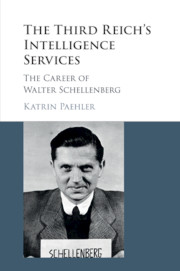Book contents
- Frontmatter
- Dedication
- Contents
- List of Figures
- Acknowledgments
- Archives
- Introduction
- 1 Gaining a Foothold
- 2 Rising Star
- 3 Intelligence Man
- 4 Office VI and Its Forerunner
- 5 Competing Visions: Office VI and the Abwehr
- 6 Doing Intelligence: Italy as an Example
- 7 Alternative Universes: Office VI and the Auswärtige Amt
- 8 Schellenberg, Himmler, and the Quest for “Peace”
- 9 Postwar
- 10 Concluding Thoughts
- Appendix
- Glossary
- Index
7 - Alternative Universes: Office VI and the Auswärtige Amt
Published online by Cambridge University Press: 31 March 2017
- Frontmatter
- Dedication
- Contents
- List of Figures
- Acknowledgments
- Archives
- Introduction
- 1 Gaining a Foothold
- 2 Rising Star
- 3 Intelligence Man
- 4 Office VI and Its Forerunner
- 5 Competing Visions: Office VI and the Abwehr
- 6 Doing Intelligence: Italy as an Example
- 7 Alternative Universes: Office VI and the Auswärtige Amt
- 8 Schellenberg, Himmler, and the Quest for “Peace”
- 9 Postwar
- 10 Concluding Thoughts
- Appendix
- Glossary
- Index
Summary
[A] perennial conflict existed between this service and the Foreign Office. The constant state of open war was interrupted by occasional periods of external armistices.
Wilhelm Hoettl, Interrogation Report No. 18, July 16, 1945[B]ut the SD wanted to make foreign policy, which he could not allow. A serious struggle with the SD therefore developed in the last few years.
Report on Ribbentrop Interrogation of June 30, 1945The Abwehr, Germany's military intelligence service, always serves as Office VI's main historiographical foil, for the agencies' contentious relationship defines the scholarly literature. Office VI's self-definition as a foreign intelligence service, its claim for totality, and its usurpation of the Abwehr in 1944 account for this focus. Yet as the preceding chapters have shown, it was comparatively easy for Office VI to paint the Abwehr as insufficiently ideologized and to take it over. A closer investigation indicates, however, that Office VI's main rival was not the Abwehr, but the Auswärtige Amt under minister Joachim von Ribbentrop. Confrontations between Office VI and the Auswärtige Amt were endemic to Office VI's understanding of its role at the intersection of intelligence gathering and ideological foreign political activism. The tensions between the two entities only grew as Schellenberg, who fancied himself a foreign policy expert and a politician, came into his own as the head of Office VI and deliberately encroached on the sphere of the Auswärtige Amt.
The Auswärtige Amt reported on political and economic developments abroad; this had been a key task of diplomatic posts since time immemorial. With its concentration on political and economic information and its poorly defined mandate, Office VI was set to infringe on Auswärtige Amt territory – initially by default but increasingly by design. However, conflict was not restricted to Office VI's information gathering. Ribbentrop attempted to make the collection and evaluation of information central to his office and even though he targeted primarily information gathering in Goebbels' Propaganda Ministry, Office VI was affected as well.
- Type
- Chapter
- Information
- The Third Reich's Intelligence ServicesThe Career of Walter Schellenberg, pp. 218 - 267Publisher: Cambridge University PressPrint publication year: 2017

